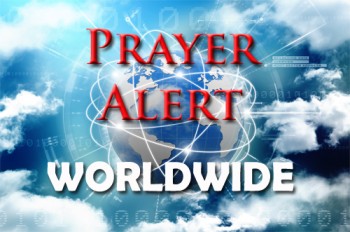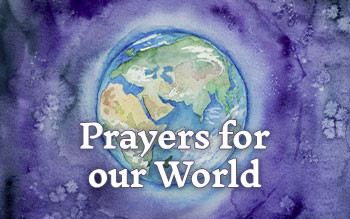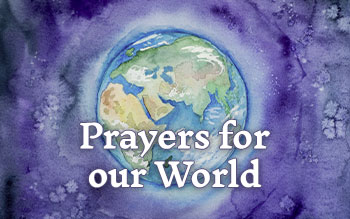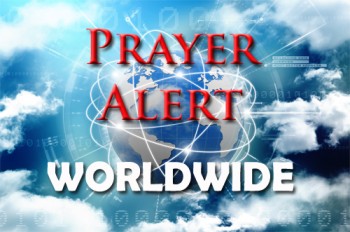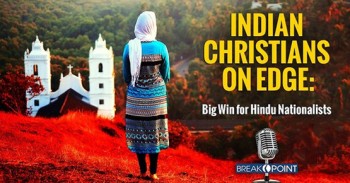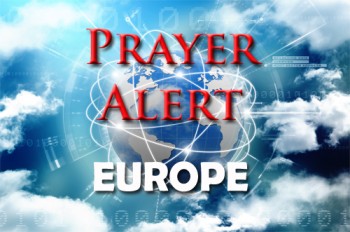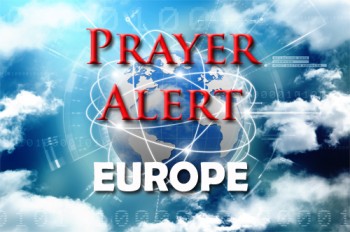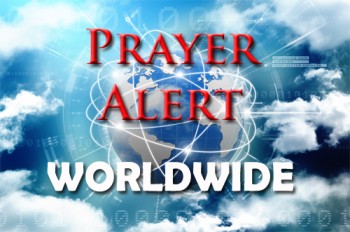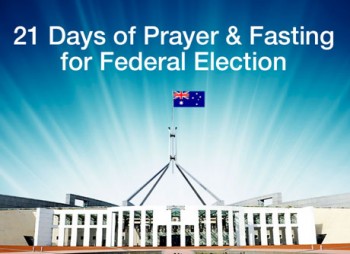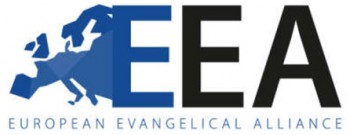Displaying items by tag: elections
Israel: pray for snap elections
Following April’s elections Benjamin Netanyahu failed to form a governing coalition, the first such failure in Israeli history. Snap elections will now be held on 17 September. The polls predict another election result that would make it impossible to form a government. Pray for a breakthrough, asking God to bring about His government for Israel. Claim the words of Isaiah 1:26 for these elections. Let the voters have Your mind, particularly as they weigh up Netanyahu’s plan to annexe 600 square miles of Palestinian territory. May the results bring a government through which You can be glorified, and may every stumbling stone to prevent a godly government be removed. The autumn feasts of Rosh Hashanah, Yom Kippur and Succoth begin soon. Pray for Jews to be reconnected to their biblical roots and see the King of Israel, their Messiah and Lord.
Prayer for the Canadian Elections - 21 October 2019
Please Pray with us for the 2019 Federal Elections in Canada:
1) Media - We are seeing an obvious manipulation of Canadians opinion in most of our mainstream national news forums. Global warming is being almost endlessly platformed and one news commentator stated that if you were interested in our environment and the future of our children, then there is only one party that you can vote for. (Liberal Party).
It is also what we are seeing that is not being reported. For example, we are not hearing of the huge protests and lawsuits being raised by many of our First Nations People regarding their desire to see pipelines built across our nation.
In addition, our current government has recently given over 600 million to news agencies that they deem to be good for our nation. This obvious ‘by-off’ by our government needs to be countered by righteousness.
2) Freedom of Speech / Religion - Three of the four main political parties have policy so that you cannot even run for those parties if you hold to a Pro-life viewpoint. This needs to be challenged in our Supreme Court as anti-democratic.
We are also seeing huge increases in those who want to be euthanized in Canada and many of our physicians and other medical personnel are being denied their freedom of conscience who would choose to not be implicitly involved.
3) Life - Canada is only one of three countries in the world with no law concerning abortion, (China, North Korea). In a recent Parliamentary meeting, one Member of Parliament stood announcing that Canada stands for abortion at any time in pregnancy and for any reason. (We are praying that the enemy has over-played his hand!).
4) Voter Turnout - Typically, there has not been a great difference between the percentage of Christians who vote and non-Christians. We are praying for effective national communication that will help pastors and other leaders to clearly see the crisis we are in. That boldness will replace fear and unrighteous issues will be addressed from our pulpits across Canada. Pray that Christians will be encouraged to register their voice in our nation by voting. What would happen if 100% of Christians voted?
5) Our God-Given Destiny - For Canada to arise and shine to fulfil her calling of Healing to the Nations, for Righteous Government to come forward in this season. (Recently submitted by the Canberra House of Prayer for Canada).
6) A Right Perspective Regarding Government - Please pray that Canadian Christians would not put all their focus on government as the only way we can positively change our nation. When we make all our problems political, we are saying therefore, that all our answers can only be political. This raises government to a place they were never meant to be. Jesus is the right solution, and he will be seen in us as we rightly minister to those around us, changing culture to eventually change government. Yes, prayer and righteous action are needed for our government, but let’s not make government something it was never intended to be.
Pray that Canadian Christians will develop a God-given compassion for those who are lost in our nation and are doing what they believe to be right in their own eyes.
Prepared by a National Prayer Leader in Canada
More info:www.nationatprayer.ca, www.transformationcanada.ca/prayer-for-election/, and www.canadainprayer.com/prayer-for-canada
India – Prayer Focus
Our IPC Colleague and Exec Member, Onassis Jeevaraj has prepared an INDIA - Prayer Focus guide. The four-page PDF booklet provides an up to date overview of some of the key issues and challenges that India is facing, along with Prayer Pointers and links to more information and resources.
Topics covered include - Elections, Persecution, Lynching, The Economy, Hindu Ideologies, Natural Disasters, Children and Women, and the Church
It will be a valuable tool for guiding individual, small group or corporate prayers.
Download the INDIA - Prayer Focus HERE
Canada: Christians mobilising for elections
In September 2018, some evangelical leaders in British Columbia unveiled a statement on sexuality and gender identity after 21 days of fasting and prayer. ‘We believe this to be a historic moment both here in BC and Canada,’ said a pastor, in a video of the event. Supporters included Laura-Lynn Tyler Thompson, a People’s Party of Canada candidate who has been outspoken against sexual orientation and gender identity (SOGI) education in schools. The statement says, ‘We are hereby revealing, for the first time, the West Coast Christian accord, which in 14 articles provides a Biblical statement on the supremacy of Christ, the authority of scripture, salvation, marriage, sexual orientation, and gender identity.’ That document now forms the basis of the growing One Accord movement, which seeks to encourage Christians across Canada to vote in the upcoming election (on 21 October) for candidates who they think will protect their Christian beliefs.
India Elections: Christians on Edge
Big Win for Hindu Nationalists
Narendra Modi was recently sworn in for a second term as India’s Prime Minister. His party, the BJP, won a resounding victory in parliamentary elections.
As Indian pundits – a word that is, by the way, of Indian origin – will tell you, if Modi and the BJP were the obvious winners, their political rivals, the Congress Party, were the big losers. But there’s another potential loser in these elections, one that should especially concern American Christians, and that’s Indian Christians.
To understand why, you need to understand Hindutva, which is the BJP’s governing ideology. It literally means “Hinduness,” and defines what it means to be an Indian in religious—to be specific, Hindu—terms. Hindutva regards Christianity and Islam as foreign religions, and therefore any Indian who claims to be a Christian or a Muslim is less than truly Indian. According to this ideology, Hinduism is central to what it means to be an Indian.
While most of the world mistakenly sees India as a land of Gandhi, gurus, and nonviolence, there’s nothing peaceful or tolerant about Hindutva. For instance, the man who assassinated Gandhi was an adherent of Hindutva who felt Gandhi had betrayed the Hindu community.
In the run-up to the election, one BJP candidate called Gandhi’s assassin “a patriot.” Though Modi denounced the comments, they are consistent with the principles of Hindutva. More concerning are the many examples of Hindutva-inspired persecution of Christians in India, especially in the five years since the BJP first came to power.
In the weeks before the election, there were reports of “food deprivation, beatings, and jail” directed at Christian converts in the eastern Indian state of Jharkhand.
As Open Doors put it, “because radical Hindu nationalists view followers of Jesus as alien to the nation, all Christians in India are suffering persecution. Driven by a desire to cleanse their country from Islam and Christianity, nationalists do not shy away from using extensive violence to achieve their goals.”
Part of their campaign to cleanse India of Christians involves anti-conversion laws. At least six Indian states effectively prohibit conversions to Christianity. I say “effectively,” because Hindu nationalists there have found a way around the freedom of religion guaranteed in the Indian constitution. Any conversion that results from “force, allurement or fraudulent means” is illegal. Given the vagueness of these terms, Indian law empowers ideologically-driven local officials to view all conversions as guilty until proven innocent.
For all these reasons and more, India currently ranks tenth on Open Doors World Watch List—which is eleven spots higher than when the BJP first assumed power.
All of this may come as a surprise given what we often hear or read about India in mainstream media outlets. For example, a recent discussion of the Indian election on a New York Times podcast explained the threat to Indian Muslims, but made no mention of the persecution of Indian Christians.
To be fair, India does have the second-largest Muslim population in the world, and the most visible religious conflict there falls along Hindu-Muslim lines. Still, there are more than 30 million Christians in India, and there’s some reason to believe that this number may be significantly understated. Muslims aren’t the only targets of Hindu extremism. Indian Christians are rightly concerned about what Modi’s triumph means for them.
We should be concerned as well. After all, contrary to Hindutva ideology, Christianity is no European import. It existed in India before Paul reached Rome. Some churches in southern India even worship in an offshoot of Aramaic, the language Jesus spoke.
We must pray for our Indian brethren, asking God to preserve the faith in a subcontinent where it is every bit as native as that which seeks to drive it out.
Reported by JOHN STONESTREET WITH ROBERTO RIVERA
More at: http://www.breakpoint.org/
European parliament elections: Brexit Party
73 MEPs will be elected in the UK on 23 May, and the Conservative party potentially faces an angry backlash from voters. Nigel Farage’s new Brexit Party has more support than the two traditional British parties combined. Britain’s education minister Damian Hinds said that the elections were a second referendum that would be difficult for Conservatives. The latest opinion poll gives the Brexit Party 34% of the vote, yet it was only founded in April. Fourteen of UKIP's seventeen MEPs have defected to it. Nigel Farage said there has been a breakdown of trust between people and politicians, as the two main parties have failed to deliver the result of the Brexit referendum. See
European parliament with anti-European parties
After the Second World War many said, ‘Never again’. For decades extreme nationalism was considered a threat. In 2019 it has re-emerged with European far-right parties forming a new alliance led by US strategist Steve Bannon, wanting to ‘promote’ right-wing populist groups in Europe. Matteo Salvini, Italy’s leader of the extremist League party, has joined ‘The Movement’ and has gathered right-wing Netherlands Party for Freedom, Germany’s AfD, Danish People's Party, the Finns Party and other extremist populist parties to form a new alliance, injecting their rhetoric into the EU; selling themselves as ‘maintaining or protecting their heritage and their people (they warn that refugees, Muslims, empowered women, and the EU bring unwanted change, which is a bad thing). A YouGov survey for voting intentions shows that the European parliament will be significantly different after 25 May with 35% of seats taken by socialists, Greens, the European People’s Party, and other anti-European parties. See
South Africa: pivotal elections
Twenty-five years ago, under Nelson Mandela, the African National Congress (ANC) party ended apartheid, but since then it has governed poorly. Four in ten South Africans still live in poverty. Half of young people are unemployed, in an unequal society caused by corruption at all government levels. Seven out of ten South Africans don't trust politicians and many under-30s did not bother to vote in the 8 May elections. At the time of writing, ballot results are trickling in with the results expected on 11 May. The weakness of its challengers means that the ANC is expected to win again, but national projections show a drop in support of 8%. Recently the ANC replaced President Zuma with his deputy, Cyril Ramaphosa, who is attempting to recover stolen state funds. So far he has been unable to remove the deeply entrenched crony networks of corrupt local officials and power brokers who deliver many votes for ANC. See also the previous article, and
Australia 21 Days of Prayer for National Elections
21 Days of Prayer & Fasting 28 April – 18 May 2019
“If My people who are called by My name will humble themselves and pray and seek My face, and turn from their wicked ways, then I will hear from heaven, and will forgive their sin and heal their land.” - 2 Chronicles 7:14
We ask for Christian leaders and churches of all denominations from all over the world to pray for Australia, as wethe People of Australia, Pray and Fast for 21 days up to the Federal Election, Saturday 18 May 2019.
This prayer call was inspired by Ps Margaret Court’s love for Australia, her passion “for the church to arise and be a strong voice for righteousness, truth and justice”and her love for the word of God which says that, “Righteousness exalts a nation, but sin is a reproach to any people.”Proverbs 14:34.
“Hear me, O LORD, hear me, that this people may know that you are the LORD God, and that you have turned their heart back to you again.”1 Kings 18:37
- Pray that God would rule over this election that righteous leaders would be elected to govern Australia in truth and justice because, “When the righteous are in authority the people rejoice.”Proverbs 29:2
- Pray God’s blessing upon Australia’s parliamentarians and leaders, including their families and all the candidates of all the parties standing for this federal election.1 Timothy 2:1-3
- Pray for a multiplication of prayer and unity across the Body of Christ in Australia that people will wakeup to the dangers facing our nation and respond in prayer. Ephesians 5:14
- Pray for a Spiritual Awakening for Australia, Revival and Transformation for Australia and the proclamation of the Gospel of the Lord Jesus Christ. John 3:16
Warwick Marsh
Promo Video: https://www.youtube.com/watch?v=rTowvtNdkzc
Facebook Video: https://www.facebook.com/nationaldayofprayerandfasting/videos/386871382169790
For More Info &Daily Devotions: http://www.canberradeclaration.org.au/prayer/election-2019
Europe: Praying for the Parliamentary Elections 23-26 May 2019
Christian Responsibility for Europe
Uniting in prayer, hope, reflection and action
Shaping Europe’s future – the European Parliament
The European Parliament can seem remote from daily life but it helps to shape the values and direction of our continent. Through its power to block and amend legislation and to lobby hard for other changes, the European Parliament has huge influence. Between 23rd and 26th May, EU citizens will get the chance to vote and thus collectively choose who will represent them at European level until 2024.
What will the European Union look like in 5 years’ time? What values will European society prioritise? Members of the European Parliament (MEPs) will have a big say over the answers. What challenges will this continent face? MEPs will help choose Europe’s response.
Europe needs prayer
Of course it is always important to pray for politicians (1 Timothy 2: 1-4) and election seasons are especially significant. But, if we step back and look at our continent as a whole, it is clear that Europe is in trouble. So the importance of intercession is huge. Across Europe, fear, division and even anger are common, truth is often getting lost or ignored in the noise. Every nation and the EU institutions themselves are falling short of God’s standards as Evangelicals have historically believed them to be. We have been given good gifts of family, freedom, nation, human rights, security, sex, often relative economic prosperity, etc. but we have turned them into idols as we prioritise them over the Lord or distort them from what he designed them to be. Secularism, meanwhile, makes politics itself an idol and tries to silence other faith-inspired voices. There is also a growing culture of “them versus us” in which many believe that those they disagree with are completely wrong whereas they are completely right. This makes it difficult for people to see good in those who oppose them or to examine their own faults. As a result, wisdom is lost, pride and stubbornness abound.
Hope and responsibility
Individual Christians can feel powerless as they look at these socio-political and economic challenges. We can wonder if there is any point in praying about elections. But, hope returns when we focus our attention on the King of Kings, the one who is in ultimate charge and isworking out His eternal Kingdom purposes no matter what. As we remember that we are called to pray that “His will be done on earth as it is in heaven”, we are motivated to persevere in our intercession. But it also means that we have homework to do – to work to understand what is happening on earth and equally try to understand the will of the Lord. We do this in humility, remembering that we will not fully comprehend until Jesus returns.
Strength in unity
There is particular power and wisdom in praying and reflecting together with other Christians. The diversity of local Church (and indeed Church at national or European levels) means we can choose to understand the lives, problems, gifts and opinions of those who are very different to us. Our identity in Christ gives us a firm foundation for mutual respect, collaboration and the possibility of softening our opinions. We know that, when we pray in humility, repentance and unity for our nations, we can be confident that the Lord listens and will heal (2 Chronicles 7: 14). And when we consider socio-political matters with those who are different to us, it becomes much easier to find a truly biblical perspective on what is important.
A biblical worldview sustains democracy
There is much we can agree on from the Bible. We know that every single human being is made in the image of God and, therefore, has infinite value. So Christians are united in wanting to see European society valuing all, no matter their sex, age, ethnicity, faith or worldview, “economic usefulness”, health or if they are yet to be born etc. As image bearers, every human has the capacity for immense and creative good, so we seek a Europe where there is opportunity for that flourishing contribution from each one. But, since the Fall, each human is capable of unspeakable sinfulness. And so public policy and, indeed, the political system itself must take this into account.
It is this biblical worldview which has provided the foundation for sustainable democracy and free societies.
- Since human beings can do good, they should be able to contribute to the political decision making system and to society.
- Since human beings can do evil, democratic systems should spread power as widely as possible, not allowing any individual or institution to dominate.
- Since every human being has infinite worth, politicians should work for the good of all, including those who did not or could not vote for them.
So let’s be proactive in our praying, voting and influencing to speak up for these core biblical principles and to protect and strengthen the health (in God’s eyes) of our democracy, nations and continent.
Uniting despite differences
As Christians, we should be able to agree on foundational principles of what the Lord would want but there will still be much we continue to disagree on. Since no political party has a monopoly on truth and wisdom, Christians will vote in different ways. But, there is still huge value in praying and discussing together, asking for the Lord’s blessing and mercy, and seeking to understand what is needed for His Kingdom values to be more strongly reflected across our continent.
Therefore, the European Evangelical Alliance urges its members and local churches across the EU to unite in
- non-partisan intercession for our nations and continent,
- biblical reflection about the Lord’s values, listening to other opinions, asking big questions,
- challenging untruth, disrespect and idolatry,
- encouraging people to study political manifestos carefully and to vote.
Politics has its limits
However, no matter how important these elections are, politics becomes an idol when we expect it to solve every issue, give 100% guarantees of security and answer our every need. We look to the King of Kings first, trusting in His sovereignty and ultimate Kingdom purposes. And we also understand the responsibility of citizens to contribute to the common good. Local Church has a particular joyful task to offer the hope of Jesus Christ in word and deed. There is so much anger, fear, loneliness, injustice and hardship around. The Church is doing a vital job in serving communities, reaching out to the most vulnerable, encouraging neighbourliness, building peace, offering hope for today and ultimate hope for eternity. Let’s keep going, whatever happens in political life.
Pray for the European Parliament elections 23-26 May 2019
Christians may vote for different political parties but there is great significance in praying together in humility and unity for our nations and continent.
Here are suggestions for united intercession. We invite people to pray in non-partisan ways
so that all Christians can say AMEN.
Let’s pray for
- the well-being of all candidates and their families during this stressful time,
- peaceful and safe campaigning and voting,
- truth to be sought, seen and heard, valued and accepted,
- opportunities for respectful debate, with a variety of voices being heard,
- growing support for core biblical values, including love, truth, justice, righteousness, forgiveness, integrity, respect, service and generosity,
- the success of politicians who will
- preserve and strengthen democracy and freedom,
- work for the good of all, including the weakest and most vulnerable,
- be a blessing to their nation but also work well with politicians from other nations.
- The next 5 years of the European Union to be a period
- where mutual respect and listening in political debate increase,
- where every Member State of the EU is able to be and to offer its best to the whole and to be humble enough to learn from others,
- where there is greater understanding of the value of every human being,
- where wise and just decisions are made to face the many economic, technological, environmental, social and security challenges Europe faces, and where the weakest are better protected,
- where freedom of religion or belief and of expression are strengthened,
- where decisions are made at the appropriate level – European, national, local,
- where there is a stronger connection and trust between politicians and officials and the citizens of the European Union.
